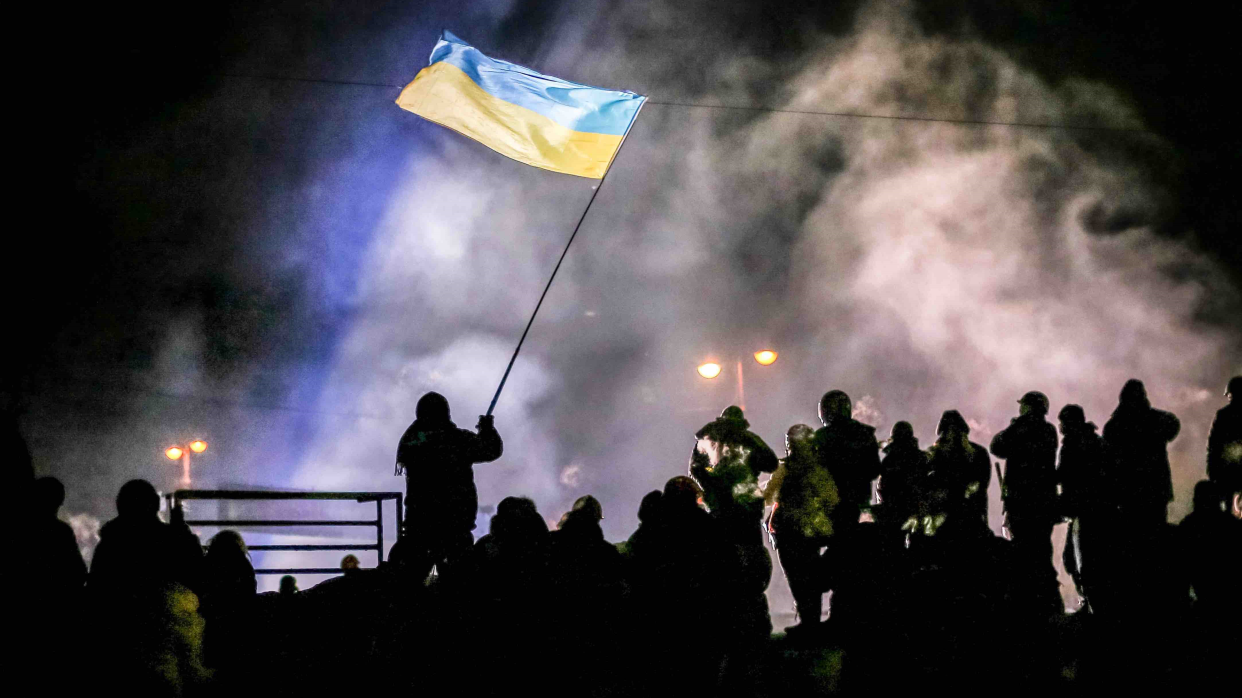Venice Film Review: ‘Winter on Fire: Ukraine’s Fight for Freedom’

The 2014 Ukrainian revolution that ousted president Viktor Yanukovych receives straightforward coverage via the sights and sounds of people on the ground in Evgeny Afineevsky’s “Winter on Fire: Ukraine’s Fight for Freedom.” Taking a more traditional history-in-the-making approach than Sergei Loznitsa’s “Maidan,” the docu corrals an impressive amount of video footage but is hamstrung by its rose-tinted “the people united will never be defeated” p.o.v. Getting swept up in the immediate excitement is entirely understandable, but ignoring the less savory elements, such as ultra-nationalist rhetoric, is problematic at best. Backing by Netflix will markedly boost exposure, especially if marketed as a Ukrainian version of popular docu “The Square.”
Russian-Israeli director Afineevsky (“Oy Vey! My Son is Gay!!”) was on the ground throughout the popular uprising, coordinating a large team of cameramen and women (28 are credited) who covered various locations throughout the difficult, at times frighteningly violent three-plus months. To ensure the broadest international viewership, Afineevsky then wooed noted editor Angus Wall to board as one of the producers; Wall re-envisioned the docu’s approach “to create a more compelling narrative” that would be readily comprehensible to all. The resulting film is certainly easy to follow — arranged by day, with helpful maps pinpointing the various flare-ups.
In addition, the docu more or less sticks to one viewpoint: The people of Ukraine were furious that Yanukovych went behind their backs to forge closer alliances with Putin’s Russia, when what they really wanted was firmer ties to Europe. As an underlying narrative for the capital Kiev, the account is true, yet it ignores large parts of the country’s Eastern provinces, some of which are currently fighting for either greater independence or Russian annexation.
Instead, “Winter on Fire” presents a single-opinion storyline, utilizing a wealth of interviews from a notably diverse group of people who reinforce the idea that everyone was working toward a common goal: Activists, doctors, retired military, religious leaders and entertainers all describe the feelings of euphoria, followed by fear and resolve as the demonstrators became ever more determined to bring down Yanukovych (whose monumental corruption is oddly never addressed).
All started peacefully in November 2013, when journalist Mustafa Nayyem and others put out a Facebook call for people to gather in Kiev’s Maidan Nezalezhnosti (Independence Square) in protest at Yanukovych’s reluctance to forge closer ties with Europe. A party atmosphere prevailed in those early days, but then the Berkut (special police forces) were called in, using truncheons indiscriminately against protesters. As the crowd became more organized, the Berkut increased the level of violence, assisted by hired thugs known as Titushky.
Barricades were erected and melees ensued, with the Berkut showing no compunction in attacking medical facilities set up to tend the wounded. Yanukovych’s parliament passed repressive laws to stop the gatherings, but by then the people refused to budge, and the Berkut exchanged rubber bullets for live ammo. By the time Yanukovych fled on Feb. 22, 2014, 125 people had been killed, with 65 missing and 1,890 injured.
Unlike Loznitsa with “Maidan,” Afineevsky isn’t aiming for artistic rigor: This is simplified instant history as triumphalist narrative, with only a bit of text at the very end to say that the country remains in turmoil following Russia’s annexation of Crimea. “Winter on Fire” is a more accessible film, with greater TV appeal, but it’s also more limited by its insistence on shoehorning everything into one perspective, albeit a perspective shared by many. It’s nice to hear interfaith voices all speaking to a common goal, but one wonders just how united a progressive activist would be with, hypothetically, an ultra-nationalist from the Svoboda party.
Chief editor Will Znidaric deserves much credit for wrangling so much footage into a comprehensible whole that flows easily from day to day without much repetition. Visuals vary in quality but are mostly sharp and often disturbing (there’s a lot of blood), while Afineevsky and Co. do an excellent job making sure the films match what the interviewees are saying. An opening English voiceover, providing a potted history of post-independence Ukraine, is needlessly melodramatic, made worse by histrionic music.
Related stories
Netflix Sets Premiere of 'Winter on Fire' Ukraine Citizen Uprising Documentary
Get more from Variety and Variety411: Follow us on Twitter, Facebook, Newsletter
